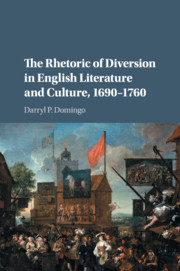
- Cited by 3
-
Cited byCrossref Citations
This Book has been cited by the following publications. This list is generated based on data provided by Crossref.
Jones, Emrys D. 2018. Intimacy and Celebrity in Eighteenth-Century Literary Culture. p. 165.
Dye, Jill Smith, James A Coffey, Bysshe Inigo and Harriman-Smith, James 2018. XIIThe Eighteenth Century. The Year's Work in English Studies, Vol. 97, Issue. 1, p. 574.
Zuroski, Eugenia 2019. British laughter and humor in the long 18th century. Literature Compass, Vol. 16, Issue. 3-4,
- Publisher:
- Cambridge University Press
- Online publication date:
- March 2016
- Print publication year:
- 2016
- Online ISBN:
- 9781316536544
- Subjects:
- Literature, English Literature 1700-1830


